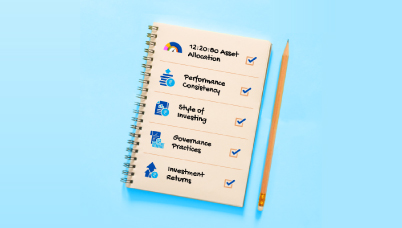Long Live Your Mutual Fund Investments!
Posted On Wednesday, May 28, 2014
Borrowed from Joel Ponzio’s 10 commandments for intelligent investing, the words “there is no tomorrow, only five years from now” convey volumes about finding success in mutual fund investments.
The tendency of reading and reacting to short term market conditions in investing is detrimental to the health of one’s investing life. Not only does it end up robbing investors of returns but tends to discourage investors from making further investments. Investors who have burned their fingers are likely to distance themselves from stock markets forever and convince others too, if it were possible.
Instead a good investor follows the Law of the Farm. For a great harvest a farmer must carefully plan, work consistently and diligently over a long period of time.
The emphasis on selecting the right mutual funds suiting your goal could not be lesser. It is of utmost importance where you sow and how much you sow. One must be careful not only while choosing the class of fund and the amount of investment but also with the choice of fund house. Secondly for your investment seeds to give a good harvest they need to be watered and looked after well. The management of your invested funds entirely depends on the AMC but if you made your first step right, that is picked your fund and fund house with caution, you would not have to worry about this part. Thirdly – which is the central point of this discussion – investments need to be given a long, long time.
Perhaps the world we live in today, where 'instant' is the order of the day – instant noodles, instant transfer, instant recharge – to make investments for the ‘long term’ could sound out of place or even intimidating. But then why does it seem to be an exception with just mutual funds or stock markets? With FDs, ULIPs, PPF and other products 5, 10 or 15 years is comfortable, or actually the norm. Why then is our behaviour different for mutual funds?
However the good thing is volatility reduces dramatically when long term performance is considered. Have a look at the table below showing performance of large cap mutual funds taken over various periods in the past 4 quarters.
| Performance as on | 1 Year | 2 Year | 3 Year | 5 Year | 7 Year | 10 Year |
| 31 Mar 2014 | 19.6 | 12.78 | 6.44 | 19.49 | 10.18 | 16.54 |
| 31 Dec 2013 | 5.74 | 17.03 | 2.47 | 18.04 | 8.29 | 15.75 |
| 30 Sep 2013 | -0.87 | 6.50 | -1.18 | 10.06 | 8.26 | 18.19 |
| As on 28 Jun 2013 | 11.16 | 2.42 | 3.45 | 9.45 | 11.58 | 21.29 |
Past performance may or may not be sustained in future
It is plainly observable that the 1 year returns of these funds varied from -0.87 % to 19.6% whereas in longer term performances beyond 5 years the range of variation is narrower.
So this emphasizes a precious trait an investor needs to build to be truly successful with investments – psychological resilience against the short term troughs and crests of the market. Forget about where the markets would be tomorrow, next week or next month. Focus on longer term trends and just remind yourself that since life is expected to go on, businesses would continue to make profits and stock prices would reflect them. Accordingly well managed mutual funds would give commensurate returns.
And for those of you who wonder just how many months or years make ‘long term’ in investing the team at Quantum Equity Direct had undertaken a study to understand the pattern of Sensex returns over the past 34 years. The finding from the analysis was published in a past article titled How Long Should Long Term Investments Be; kindly go through it if you happened to miss it.
As an intelligent investor what you need to do is to "stay calm" and patiently focus on long term outcomes, provided you have selected the investments after proper evaluation in the first place! If you made a lumpsum investment or are running an SIP with a specific goal down in the future, do not be tempted to sell now and do not be worried about starting an SIP no matter what levels the markets are at.
Have queries for us? Write to us or dial our toll-free no 1800-209-3863/1800-22-3863 to talk to one of our Customer Interaction executives. Do consult a financial advisor before investing.
The views expressed here in this article are for general information and reading purpose only and do not constitute any guidelines and recommendations on any course of action to be followed by the reader. The views are not meant to serve as a professional guide / investment advice / intended to be an offer or solicitation for the purchase or sale of any financial product or instrument or mutual fund units for the reader. The article has been prepared on the basis of publicly available information, internally developed data and other sources believed to be reliable. Whilst no action has been solicited based upon the information provided herein, due care has been taken to ensure that the facts are accurate and views given are fair and reasonable as on date. Readers of this article should rely on information/data arising out of their own investigations and advised to seek independent professional advice and arrive at an informed decision before making any investments.
Mutual fund investments are subject to market risks read all scheme related documents carefully.
Related Posts
-

Do You Need to Update Your KYC/Modify KYC?
Posted On Friday, Apr 26, 2024
New KYC Regulation Effective April 1st 2024
Read More -

Are You Stuck in the Past or Ready for a Secure Future?
Posted On Wednesday, Jun 29, 2022
The ever-growing number of mutual fund schemes on offer has made it challenging for investors to select the best and most suitable one.
Read More -

Received an Increment? Step-up Your SIPs
Posted On Wednesday, Jun 01, 2022
For instance, let’s assume that you have registered for a monthly SIP of Rs 5,000 for a 10-year period and later on try to step-up the SIP at an annual frequency, say by Rs 500. In the first year...
Read More



